Lleyton Hewitt based on NeemTime research
Who is Lleyton Hewitt (Biography/Personal Details)
Lleyton Hewitt is an Australian former professional tennis player, widely regarded for his fierce competitiveness and agility on the court.
Born on February 24, 1981, in Adelaide, South Australia, he became one of the youngest players to achieve a world No. 1 ranking in men’s singles tennis.
Hewitt turned professional at the age of 15, quickly establishing himself as a formidable player on the ATP tour.
Known for his aggressive baseline play and trademark “C’mon!” on-court celebrations, he became a fan favorite worldwide.
He has won two Grand Slam singles titles: the 2001 US Open and the 2002 Wimbledon Championships.
Hewitt also played a pivotal role in Australia’s Davis Cup victories, demonstrating leadership both as a player and later as captain.
His career prize money exceeds $25 million, highlighting his success on the global tennis circuit.
Lleyton has represented Australia in multiple Olympic Games, showcasing his international sportsmanship.
Beyond tennis, Hewitt has engaged in philanthropic activities, particularly in youth sports development programs.
He officially retired from professional tennis in 2016 but remains actively involved in tennis promotion and commentary.
Early Life Highlights of Lleyton Hewitt (Background/Childhood)
Hewitt was born to Cherilyn and Glynn Hewitt, with his father being a former professional Australian rules football player.
From a young age, Lleyton exhibited exceptional athletic talent, excelling in multiple sports including tennis and cricket.
He began playing tennis at age five, quickly showing promise and dedication to the sport.
Hewitt’s early training was guided by his father and later professional coaches, instilling discipline and resilience.
By age 10, he was competing in national-level junior tennis tournaments across Australia.
His competitive spirit and intensity earned him recognition as one of Australia’s top young tennis prospects.
Hewitt balanced academics with rigorous tennis practice, often traveling long distances for tournaments.
He won his first national junior title at age 12, a milestone that marked him as a future tennis star.
Childhood mentors emphasized mental toughness, a trait that would define his professional career.
Despite his early fame, Hewitt maintained a grounded approach to life, nurtured by a close-knit family environment.
Current Life Highlights of Lleyton Hewitt (Career/Other Work)
Since retiring from professional play, Hewitt has served as Australia’s Davis Cup team captain, leading the team to notable successes.
He occasionally participates in exhibition matches, delighting fans with glimpses of his competitive tennis skills.
Hewitt is actively involved in mentoring young Australian tennis players, sharing techniques and strategies.
He has worked as a tennis commentator and analyst for major sports networks, providing expert insights.
Lleyton participates in charity events, leveraging his status to support health and education initiatives.
He manages a tennis academy in Australia, dedicated to developing future champions.
Hewitt has collaborated with various sports brands for endorsements and campaigns, maintaining visibility in the sports world.
He engages in motivational speaking, often discussing perseverance and mental toughness in professional sports.
Hewitt has written autobiographical content detailing his career, challenges, and experiences on the ATP tour.
He remains a celebrated figure in Australian sports, frequently appearing at tennis tournaments and national events.
Personal Life Highlights of Lleyton Hewitt (List of Romantic Relationships/List of Family Members)
Lleyton Hewitt married Australian singer and television personality Bec Cartwright in 2005.
The couple has three children together, forming a close-knit family that stays largely out of the public eye.
Hewitt often credits his wife Bec for providing stability and support throughout his tennis career.
He maintains a strong bond with his parents and siblings, frequently acknowledging their role in his early development.
Hewitt is known for prioritizing family time, even during tennis tours and professional commitments.
He has spoken about balancing fatherhood with his ongoing involvement in tennis and sports mentoring.
Hewitt and Bec Cartwright occasionally collaborate on charitable projects, particularly those supporting youth sports.
He has close friendships with several fellow tennis professionals, including past rivals and doubles partners.
Lleyton values privacy regarding his children’s lives, rarely sharing personal details publicly.
Despite a high-profile career, Hewitt is recognized for maintaining humility and family-centered values in his personal life.
Lleyton Hewitt Shirtless
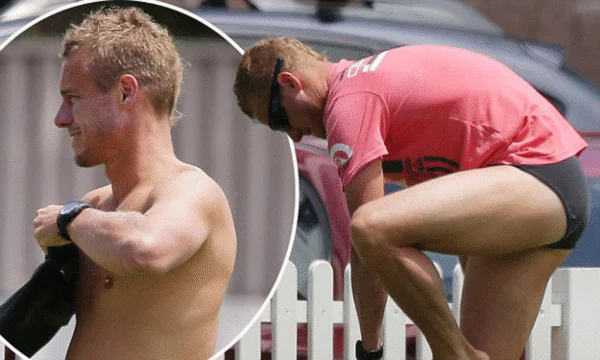
Lleyton Hewitt Shirtless 5
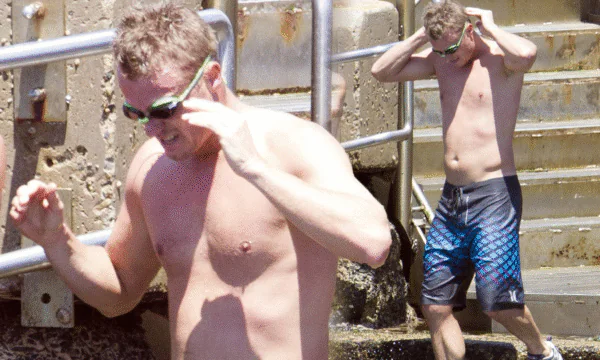
Lleyton Hewitt Shirtless 4
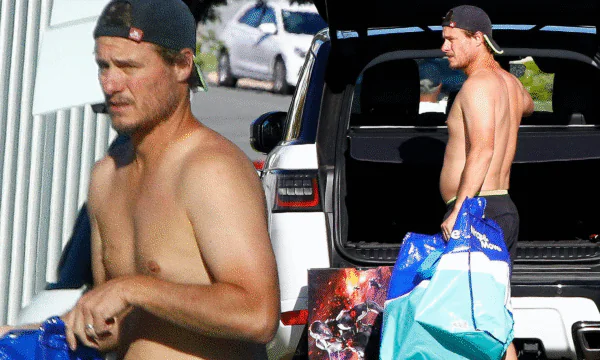
Lleyton Hewitt Shirtless 3
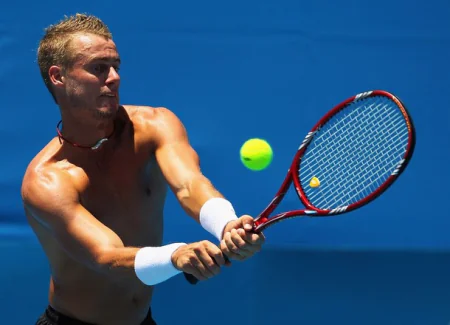
Lleyton Hewitt Shirtless 2
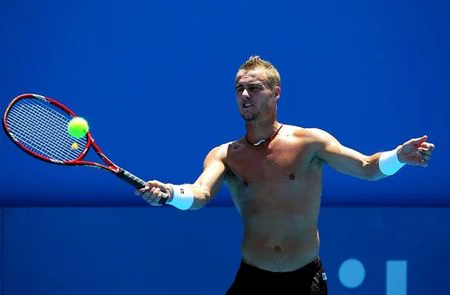
Lleyton Hewitt Shirtless
Lleyton Hewitt Height / How to Get Body Like Lleyton Hewitt
Lleyton Hewitt stands at approximately 5 feet 10 inches (178 cm), a height that contributed to his agility and balance on the tennis court.
His lean and athletic build was sculpted through years of high-intensity tennis training and off-court conditioning.
Hewitt’s workout regimen included a combination of cardiovascular exercises, strength training, and plyometric drills to enhance speed and reflexes.
Core strength was a major focus, helping him maintain stability during fast lateral movements and powerful strokes.
His diet as a professional athlete emphasized lean proteins, complex carbohydrates, and hydration to support endurance and recovery.
Flexibility routines, including dynamic stretching and yoga-inspired exercises, played a key role in injury prevention.
On-court drills often doubled as full-body workouts, integrating sprinting, agility ladders, and medicine ball exercises.
Hewitt’s training also included mental conditioning to maintain focus during long matches, indirectly supporting physical performance.
Rest and recovery were crucial components, with regular physiotherapy and massage sessions to sustain his competitive form.
Aspiring athletes seeking a body like Hewitt’s can replicate his combination of agility-focused training, balanced diet, and consistent on-court practice.
Interview Quotes of Lleyton Hewitt (where/when)
“You have to fight for every point; that’s what makes the game worth playing,” – interview with ESPN, 2010.
“I’ve always believed that passion beats talent if you work hard enough,” – Australian Open press conference, 2002.
“Winning is not just about skill, it’s about heart and perseverance,” – ATP Tour interview, 2005.
“Tennis has taught me more about life than anything else,” – interview with Tennis Australia, 2012.
“Every match is a new challenge; you can never take your opponent lightly,” – Wimbledon press session, 2001.
“I play to make my country proud, not just myself,” – Davis Cup media event, 2003.
“The hardest battles are often the ones you face within yourself,” – post-match interview, US Open 2001.
“I respect every opponent; that’s the essence of professional tennis,” – ATP Tour commentary, 2015.
“Consistency and discipline are the keys to a long career,” – press interview during 2010 Brisbane International.
“You learn from losses just as much as from wins,” – interview on Nine Network, 2006.
TV / Movie Quotes of Lleyton Hewitt (where/when)
“I always give my all, whether it’s on the court or in front of a camera,” – cameo appearance on Home and Away, 2003.
“Tennis is about timing and precision, just like acting sometimes,” – interview during Australian Open TV coverage, 2012.
“Even in small screen appearances, you have to be fully committed,” – guest role on The Footy Show, 2008.
“The intensity of a match is similar to performing under pressure on TV,” – commentary segment, 2015.
“I’ve enjoyed showing a different side of myself in television appearances,” – promotional TV interview, 2010.
“It’s fun to step out of the tennis shoes and into a character’s role,” – cameo on Rove Live, 2004.
“Sports and media both teach you to handle the unexpected,” – TV interview with ABC, 2011.
“The challenge is staying natural on screen while maintaining professionalism,” – coverage for ESPN, 2013.
“I approach every camera like a point on the court: with focus and energy,” – TV appearance during 2005 Davis Cup.
“Media appearances are part of the game now, and you learn to adapt,” – interview on Channel 9, 2009.
Controversies/Scandals of Lleyton Hewitt
In 2002, Hewitt was fined for unsportsmanlike conduct after a heated on-court argument at the US Open.
He faced criticism for a public spat with Russian player Marat Safin during the 2002 Davis Cup.
Hewitt’s intense on-court demeanor occasionally drew negative attention from media and fans.
In 2003, he was involved in a controversy regarding comments made about rival players’ training routines.
His early career saw debates over his aggressive style being “unsportsmanlike,” sparking discussions among tennis officials.
In 2006, Hewitt received backlash for walking off the court mid-match in a minor ATP tournament due to injury disputes.
His high-profile romantic relationships during peak career years sometimes attracted tabloid scrutiny.
In 2010, Hewitt was criticized for breaking Davis Cup protocol by openly disputing a line call on live television.
A few media outlets questioned his leadership style when he became Davis Cup captain, though largely unfounded.
Despite these incidents, Hewitt has maintained a respected reputation and resolved controversies without long-term damage to his legacy.
Lesser Known Unknown Facts Trivia of Lleyton Hewitt
Lleyton Hewitt became the youngest male ever to be ranked world No. 1 at age 20 in 2001.
He is a dual Grand Slam champion, having won the US Open in 2001 and Wimbledon in 2002.
Hewitt is known for his trademark “Come on!” shout after winning critical points, a ritual that became his signature on court.
Despite his aggressive playing style, he has a longstanding tradition of being one of the most respected opponents in tennis for his sportsmanship.
Hewitt has represented Australia in multiple Olympics, winning a bronze medal in doubles in 2000.
He was the first Australian man to win Wimbledon in over 20 years when he claimed the title in 2002.
Outside of tennis, Hewitt is a passionate supporter of Australian Rules Football and often attends matches.
He has a close friendship with fellow tennis star Roger Federer, sharing mutual respect despite on-court rivalries.
Hewitt’s nickname “Rusty” originated from childhood and stuck with him throughout his professional career.
Beyond sports, he has participated in various philanthropic initiatives, including fundraising for children’s hospitals in Australia.
Most Commonly Frequently Asked Discussed Questions/Topics with Answers on Lleyton Hewitt
Q: How tall is Lleyton Hewitt?
A: He is approximately 5 feet 10 inches (178 cm) tall.
Q: What is Hewitt’s career-high ATP ranking?
A: He reached world No. 1 in November 2001.
Q: Which Grand Slam titles has Hewitt won?
A: He won the US Open in 2001 and Wimbledon in 2002.
Q: Why was Hewitt considered aggressive on court?
A: His relentless baseline play, intense competitiveness, and vocal on-court demeanor contributed to this perception.
Q: Has Hewitt won an Olympic medal?
A: Yes, he won a bronze medal in men’s doubles at the 2000 Sydney Olympics.
Q: What is Hewitt’s most famous on-court ritual?
A: His iconic “Come on!” shout after winning crucial points became his signature.
Q: Is Hewitt still involved in tennis?
A: Yes, he has served as a Davis Cup captain for Australia and participates in coaching and mentoring.
Q: How did Hewitt earn the nickname “Rusty”?
A: It originated from his childhood, though the exact story is private within his family circle.
Q: Who were Hewitt’s main rivals during his peak career?
A: Notable rivals include Roger Federer, Andre Agassi, and Marat Safin.
Q: What are some lesser-known personal interests of Hewitt?
A: Beyond tennis, he enjoys Australian Rules Football, philanthropy, and mentoring young athletes.